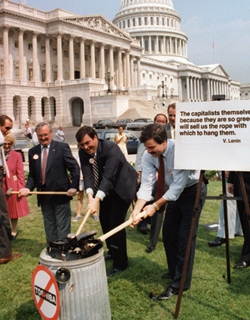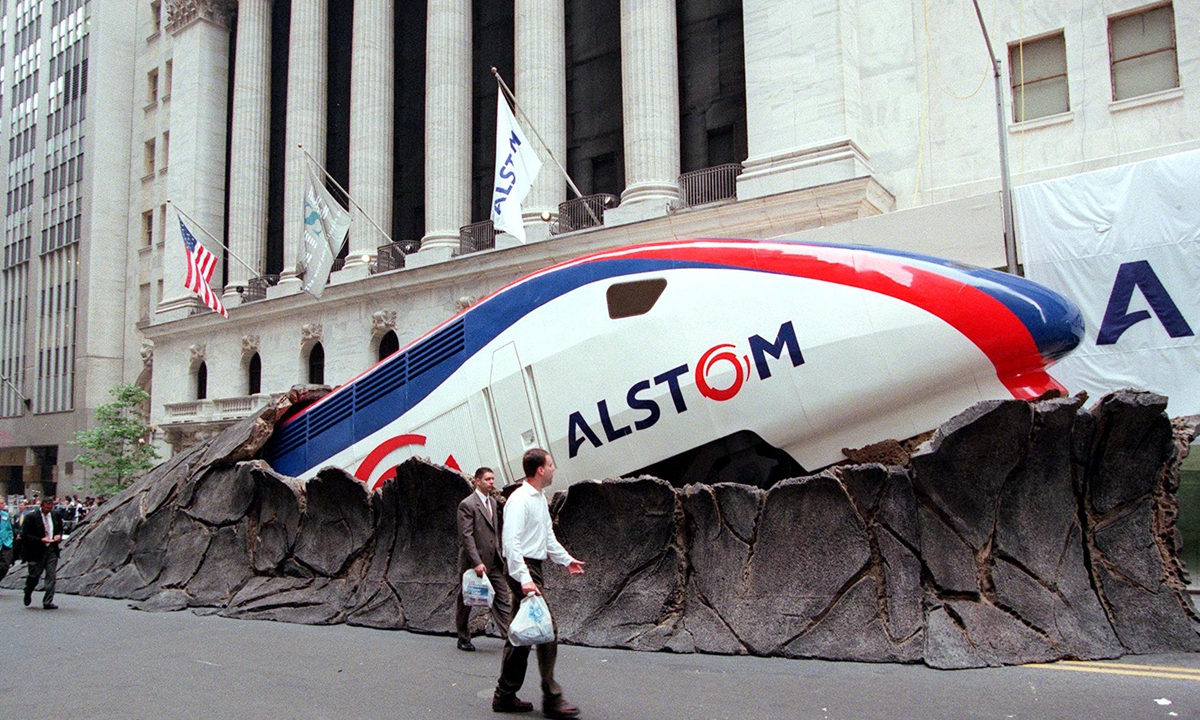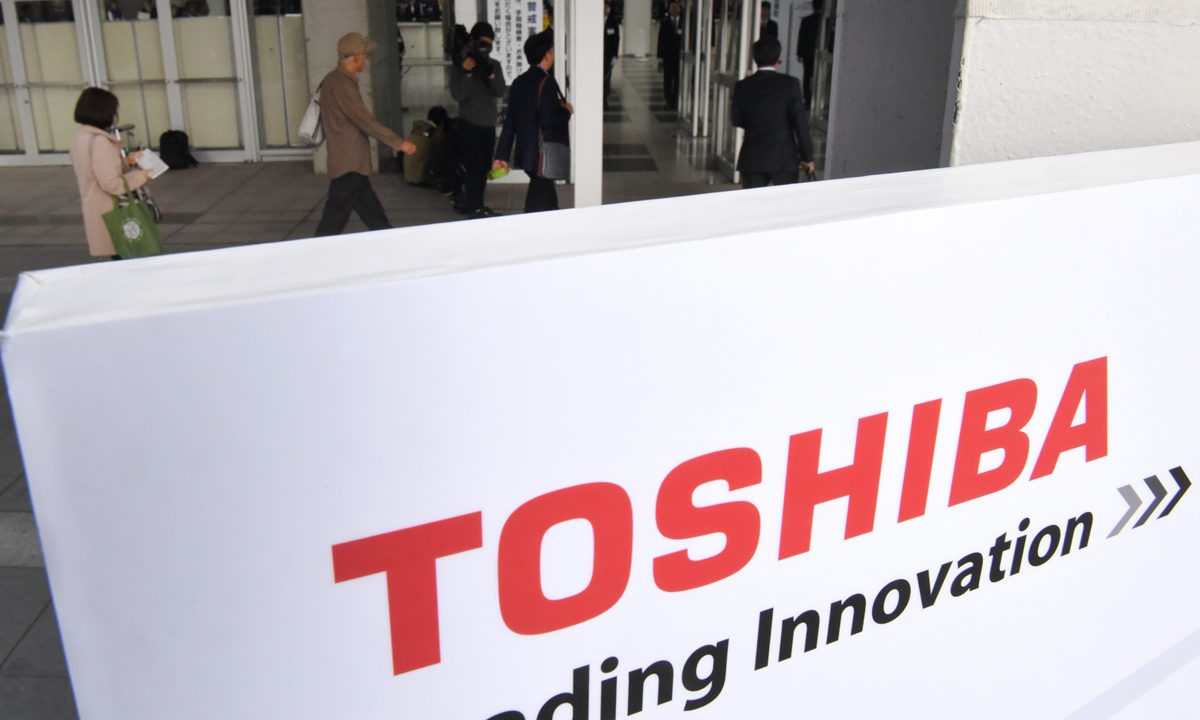Lessons from Toshiba, Alstom: how US suppresses foreign rival companies to maintain tech hegemony
By Huang Lanlan and Li Qiao Source: Global Times Published: 2020/9/28 21:07:29
The continual suppression by the US of Chinese tech companies including Huawei and TikTok has been a farce the world has watched ever since Washington started regarding these fast growing and expanding Chinese tech giants as threats to its domestic counterparts.
People in the know are no longer surprised by the aggressive treatment of foreign tech companies by the US. In past decades, companies around the world such as Japan's Toshiba and France's Alstom were targeted, sanctioned and seriously hurt by the US government that used excuses like security, anti-dumping and anti-bribery.
There is no essential difference between the suppression of Huawei or TikTok today and Washington's past crackdowns on Toshiba or Alstom, said Zhang Monan, a chief research fellow of US studies with the China Center for International Economic Exchanges. "Washington continues its technological hegemony, placing its laws and administrative instructions above market order," Zhang told the Global Times.
Chinese tech industry and firms can learn lessons from Toshiba's and Alstom's experiences, Song Guoyou, a deputy director of the Center for American Studies at Fudan University, told the Global Times. "It taught our Chinese companies to reduce dependence on US technology and its market, and to avoid being tied down by a US-led tech war," Song said.
Toshiba: 'national security threat'
Japan's semiconductor industry was in full bloom in the 1980s with government support before it was ground down by the US. It had surpassed the US as the world's largest chip supplier, and its market share of DRAM (dynamic random access memory) products reached some 80 percent in 1987, according to a Los Angeles Times article in August 1992.
Toshiba, Japan's leading chip producer at that time, was then targeted by the US over "national security concerns." After Toshiba and Norwegian military enterprise Kongsberg Våpenfabrikk, were found in 1986 to be secretly selling sophisticated milling machines to the Soviet Union, Washington issued a 2 to 5 year ban on all Toshiba Corporation products , saying the sale to the Soviet Union had posed a threat to US national security, and Toshiba had violated a Coordinating Committee for Multilateral Export Controls (CoCom) agreement, which prohibited members from exporting advanced weapons or machines to the Soviet Union.
Toshiba was reportedly severely hit by the scandal. Two of its managers were sent to jail and several senior executives resigned. The company spent some 100 million yen ($0.95 million) on advertising in almost all major US newspapers apologizing for its actions. The scandal ended up hurting its reputation and prestige it had established globally. Its many technical documents were also allegedly seized during a CIA investigation.

While it tormented Toshiba, Washington seemed to turn a blind eye to similar "wrongdoings" by its European peers. A Norwegian Police Service report revealed in 1987 that companies in several other member countries of CoCom, including France, Italy and West Germany had also sold the Soviets sophisticated milling machines, reported Los Angeles Times in October 1987. Few of these firms were specifically sanctioned by the US.
Obviously, Washington's selective targeting of Toshiba was not just motivated by so-called national security concerns. Toshiba was seen as a threat to the development of US tech firms. "The US actually reached its goal of protecting domestic [chip] industry by suppressing its biggest rival with some high-sounding excuses," Song said.
Toshiba's chip business continued to slide and the former global chip giant eventually sold its chip unit to US' Bain Capital at $18 billion in 2018, completely withdrawing from the chipmaking industry.
Alstom: the 'bribery case'
When a copy of The American Trap was spotted on the desk of Huawei founder Ren Zhengfei during a video interview in 2019, the book about the US takeover of French power company Alstom caught the attention of Chinese netizens.
Hailed as "a French industrial jewel," Alstom had been a global leader in various power and transportation fields. It had built power generation stations and transmission lines and railways.
Washington began targeting Alstom as it became a formidable competitor of US giant General Electric (GE) in many countries and regions in the early 2010s. In 2013, Frédéric Pierucci, Alstom's executive and co-author of The American Trap, was arrested by police at a New York airport for "authorizing bribes to Indonesian officials" to secure a contract.
Pierucci wrote in his book that his lawyer had been offered a plea bargain: admit his guilt and be free within months or "risk up to 125 years in jail," the BBC reported in April 2019.

Several other of Alstom's top managers were arrested in the US on bribery charges. The company was fined unprecedented $772 million in the bribery case by US judges. In 2014, GE reached an agreement with Alstom to purchase Alstom's power and grid businesses, dismembering the global industrial giant.
The Alstom case shows the long-arm jurisdictional reach of the US, which empowers the country to take legal action against foreign companies that have business or employees in the US, said Cui Hongjian, director of the Department of European Studies at the China Institute of International Studies.
Some people are comparing the US case against Pierucci and the US using its extradition treaty with Canada to have Huawei CFO Meng Wanzhou arrested in Vancouver in 2018. They say the US is using the same tactics as the Alstom case to impose a crackdown on Huawei. Neither the US nor Canada has offered clear evidence to support the US allegations against Meng.
"If Washington's suppression of Alstom had a legal basis, what it has done in the Huawei case has jumped its legal framework," Cui told the Global Times, saying the US has been containing the rise of its technological rivals through naked political means. "'China is an enemy, so you can't use its products.' This is the absurd logic that the Trump administration is using to persuade US allies to boycott Huawei and other Chinese firms," Cui said.
Lessons for China
Over the past decade, the US' legal and regulatory authorities "have subjected scores of large foreign companies to extraterritorial actions," said The Economist in a January 2019 article. The plight of these firms including Toshiba and Alstom have made many entrepreneurs, especially Chinese, anxious. They fear the US' big stick may fall on their heads during the ongoing trade and tech wars between the two countries.
The US holds a double standard in protecting its business interests, Zhang told the Global Times. "While it keeps screaming about free market and fair competition rules, it resorts to authoritarianism when foreign firms threaten to take the lead from US companies. The government is interfering in the normal business operations and elbowing aside foreign competitors using various means," said Zhang.

This long-arm jurisdiction contravenes the law of the market economy, which emphasizes technological development through healthy competition between enterprises, said Shen Yi, a professor at the School of International Relations and Public Affairs of Fudan University.
"The 'helps' that the US offers domestic companies by cracking down their foreign rivals will gradually wear down their will to develop core technologies, making US enterprises less competitive on the global market," Shen told the Global Times.
Facing US' intensified suppression of China's tech rise, China must guarantee the security of its industrial supply chain by working hard to solve the bottlenecks in core technologies, while maintaining its existing international cooperation in today's globalized economy, economists and scholars in international relations noted.
For Chinese companies that have explored, or are planning to explore overseas markets, Cui suggests they fully understand and comply with related international and local laws and rules. "When the Trump administration attempts to attack a Chinese firm by riding roughshod over laws and business rules, it can fight back in the courts to contain the attacks, or at least win sympathy from the international community," Cui said.
People in the know are no longer surprised by the aggressive treatment of foreign tech companies by the US. In past decades, companies around the world such as Japan's Toshiba and France's Alstom were targeted, sanctioned and seriously hurt by the US government that used excuses like security, anti-dumping and anti-bribery.
There is no essential difference between the suppression of Huawei or TikTok today and Washington's past crackdowns on Toshiba or Alstom, said Zhang Monan, a chief research fellow of US studies with the China Center for International Economic Exchanges. "Washington continues its technological hegemony, placing its laws and administrative instructions above market order," Zhang told the Global Times.
Chinese tech industry and firms can learn lessons from Toshiba's and Alstom's experiences, Song Guoyou, a deputy director of the Center for American Studies at Fudan University, told the Global Times. "It taught our Chinese companies to reduce dependence on US technology and its market, and to avoid being tied down by a US-led tech war," Song said.
Toshiba: 'national security threat'
Japan's semiconductor industry was in full bloom in the 1980s with government support before it was ground down by the US. It had surpassed the US as the world's largest chip supplier, and its market share of DRAM (dynamic random access memory) products reached some 80 percent in 1987, according to a Los Angeles Times article in August 1992.
Toshiba, Japan's leading chip producer at that time, was then targeted by the US over "national security concerns." After Toshiba and Norwegian military enterprise Kongsberg Våpenfabrikk, were found in 1986 to be secretly selling sophisticated milling machines to the Soviet Union, Washington issued a 2 to 5 year ban on all Toshiba Corporation products , saying the sale to the Soviet Union had posed a threat to US national security, and Toshiba had violated a Coordinating Committee for Multilateral Export Controls (CoCom) agreement, which prohibited members from exporting advanced weapons or machines to the Soviet Union.
Toshiba was reportedly severely hit by the scandal. Two of its managers were sent to jail and several senior executives resigned. The company spent some 100 million yen ($0.95 million) on advertising in almost all major US newspapers apologizing for its actions. The scandal ended up hurting its reputation and prestige it had established globally. Its many technical documents were also allegedly seized during a CIA investigation.

David Knee (C), chairman of the American Conservative Union, and his supporters destroy a Toshiba radio with sledgehammers on July 1, 1987 on the Capitol Hill lawn in Washington, DC. The US Senate voted on June 30 to ban Toshiba from selling products in the US. Photo: AFP
While it tormented Toshiba, Washington seemed to turn a blind eye to similar "wrongdoings" by its European peers. A Norwegian Police Service report revealed in 1987 that companies in several other member countries of CoCom, including France, Italy and West Germany had also sold the Soviets sophisticated milling machines, reported Los Angeles Times in October 1987. Few of these firms were specifically sanctioned by the US.
Obviously, Washington's selective targeting of Toshiba was not just motivated by so-called national security concerns. Toshiba was seen as a threat to the development of US tech firms. "The US actually reached its goal of protecting domestic [chip] industry by suppressing its biggest rival with some high-sounding excuses," Song said.
Toshiba's chip business continued to slide and the former global chip giant eventually sold its chip unit to US' Bain Capital at $18 billion in 2018, completely withdrawing from the chipmaking industry.
Alstom: the 'bribery case'
When a copy of The American Trap was spotted on the desk of Huawei founder Ren Zhengfei during a video interview in 2019, the book about the US takeover of French power company Alstom caught the attention of Chinese netizens.
Hailed as "a French industrial jewel," Alstom had been a global leader in various power and transportation fields. It had built power generation stations and transmission lines and railways.
Washington began targeting Alstom as it became a formidable competitor of US giant General Electric (GE) in many countries and regions in the early 2010s. In 2013, Frédéric Pierucci, Alstom's executive and co-author of The American Trap, was arrested by police at a New York airport for "authorizing bribes to Indonesian officials" to secure a contract.
Pierucci wrote in his book that his lawyer had been offered a plea bargain: admit his guilt and be free within months or "risk up to 125 years in jail," the BBC reported in April 2019.

Pedestrians walk past a life-size model of an Alstom train rising from beneath the road outside the New York Stock Exchange on June 22, 1998 in New York. Photos: AFP
Several other of Alstom's top managers were arrested in the US on bribery charges. The company was fined unprecedented $772 million in the bribery case by US judges. In 2014, GE reached an agreement with Alstom to purchase Alstom's power and grid businesses, dismembering the global industrial giant.
The Alstom case shows the long-arm jurisdictional reach of the US, which empowers the country to take legal action against foreign companies that have business or employees in the US, said Cui Hongjian, director of the Department of European Studies at the China Institute of International Studies.
Some people are comparing the US case against Pierucci and the US using its extradition treaty with Canada to have Huawei CFO Meng Wanzhou arrested in Vancouver in 2018. They say the US is using the same tactics as the Alstom case to impose a crackdown on Huawei. Neither the US nor Canada has offered clear evidence to support the US allegations against Meng.
"If Washington's suppression of Alstom had a legal basis, what it has done in the Huawei case has jumped its legal framework," Cui told the Global Times, saying the US has been containing the rise of its technological rivals through naked political means. "'China is an enemy, so you can't use its products.' This is the absurd logic that the Trump administration is using to persuade US allies to boycott Huawei and other Chinese firms," Cui said.
Lessons for China
Over the past decade, the US' legal and regulatory authorities "have subjected scores of large foreign companies to extraterritorial actions," said The Economist in a January 2019 article. The plight of these firms including Toshiba and Alstom have made many entrepreneurs, especially Chinese, anxious. They fear the US' big stick may fall on their heads during the ongoing trade and tech wars between the two countries.
The US holds a double standard in protecting its business interests, Zhang told the Global Times. "While it keeps screaming about free market and fair competition rules, it resorts to authoritarianism when foreign firms threaten to take the lead from US companies. The government is interfering in the normal business operations and elbowing aside foreign competitors using various means," said Zhang.

shareholders meeting of Toshiba in Chiba, suburb of Tokyo, on October 24, 2017. Photos: AFP
This long-arm jurisdiction contravenes the law of the market economy, which emphasizes technological development through healthy competition between enterprises, said Shen Yi, a professor at the School of International Relations and Public Affairs of Fudan University.
"The 'helps' that the US offers domestic companies by cracking down their foreign rivals will gradually wear down their will to develop core technologies, making US enterprises less competitive on the global market," Shen told the Global Times.
Facing US' intensified suppression of China's tech rise, China must guarantee the security of its industrial supply chain by working hard to solve the bottlenecks in core technologies, while maintaining its existing international cooperation in today's globalized economy, economists and scholars in international relations noted.
For Chinese companies that have explored, or are planning to explore overseas markets, Cui suggests they fully understand and comply with related international and local laws and rules. "When the Trump administration attempts to attack a Chinese firm by riding roughshod over laws and business rules, it can fight back in the courts to contain the attacks, or at least win sympathy from the international community," Cui said.